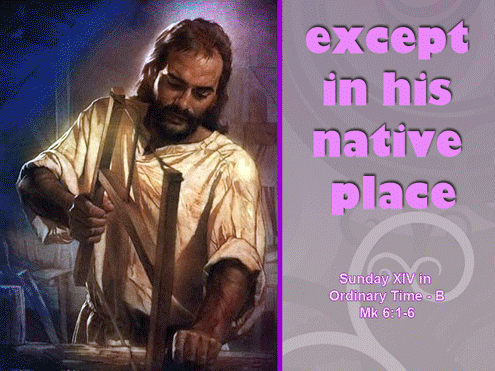
Suy Niệm: Ðức Giêsu bị người đồng hương chối từ. Mặc dù họ kinh ngạc, thán phục sự khôn ngoan của Ngài. Nhưng họ không tin Ngài, vì Ngài cũng có một nguồn gốc bình thường y như họ.
Thiên Chúa muốn làm người để cảm thông, thân thiện, chia sẻ thân phận hèn mọn của con người. Nhưng xót xa thay! Chính điểm Thiên Chúa muốn sát gần con người lại là điểm con người bị vấp phạm.
Cầu Nguyện: Lạy Chúa Giêsu, chúng con sấp mình phục bái tình yêu của Chúa.
Chúa Nhật 14 Thường Niên – Năm B
[one_half].
Bài Ðọc I: Ed 2, 2-5 “Ðây là nhà phản loạn, và họ sẽ biết rằng giữa họ vẫn có một tiên tri”.
Trích sách Tiên tri Êdêkiel.
Trong những ngày ấy, sau khi nói với tôi, Thần Linh nhập vào tôi, và đỡ tôi đứng dậy. Tôi nghe Người nói với tôi rằng: “Hỡi con người, Ta sai ngươi đến với con cái Israel, đến với dân nổi loạn phản nghịch Ta, chúng và cha ông chúng vi phạm giao ước của Ta cho đến ngày nay. Ta sai ngươi đến để nói với những con cái dầy mặt cứng lòng rằng: ‘Chúa là Thiên Chúa phán như vậy’. Hoặc chúng nghe, hoặc chúng không nghe, vì đây là bọn phản loạn, và chúng sẽ biết rằng giữa chúng có một tiên tri”. Ðó là lời Chúa.
Ðáp Ca: Tv 122, 1-2a. 2bcd. 3-4 Ðáp: Mắt chúng con nhìn vào Chúa, cho tới khi Người thương xót chúng con (c. 2cd).
Xướng: 1) Con ngước mắt nhìn lên Chúa, Ngài ngự trị ở cõi cao xanh. Kìa, như mắt những người nam tôi tớ, nhìn vào tay các vị chủ ông. – Ðáp.
2) Như mắt của những người tỳ nữ, nhìn vào tay các vị chủ bà, mắt chúng tôi cũng nhìn vào Chúa, là Thiên Chúa của chúng tôi như thế, cho tới khi Người thương xót chúng tôi. – Ðáp.
3) Nguyện xót thương, lạy Chúa, nguyện xót thương, vì chúng con đã bị khinh dể ê chề quá đỗi! Linh hồn chúng con thật là no ngấy lời chê cười của tụi giàu sang, nỗi miệt thị của lũ kiêu căng. – Ðáp.
Bài Ðọc II: 2 Cr 12, 7-10 “Tôi rất vui sướng khoe mình về những sự yếu hèn của tôi, để sức mạnh của Ðức Kitô ngự trong tôi”.
Trích thư thứ hai của Thánh Phaolô Tông đồ gửi tín hữu Côrintô.
Anh em thân mến, để những mạc khải cao siêu không làm cho tôi tự cao tự đại, thì một cái dằm đâm vào thịt tôi, một thần sứ của Satan vả mặt tôi. Vì thế đã ba lần tôi van nài Chúa, để nó rời khỏi tôi. Nhưng Người phán với tôi rằng: “Ơn Ta đủ cho ngươi, vì sức mạnh của Ta được tỏ bày trong sự yếu đuối”. Vậy tôi rất vui sướng khoe mình về những sự yếu hèn của tôi, để sức mạnh của Ðức Kitô ngự trong tôi. Vì thế, tôi vui thoả trong sự yếu hèn của tôi, trong sự lăng nhục, quẫn bách, bắt bớ và khốn khó vì Ðức Kitô: vì khi tôi yếu đuối, chính là lúc tôi mạnh mẽ. Ðó là lời Chúa.
Alleluia: 1 Pr 1, 25 Alleluia, alleluia! – Lời Chúa tồn tại muôn đời, đó là lời Tin Mừng đã rao giảng cho anh em. – Alleluia.
Phúc Âm: Mc 6, 1-6 “Không một tiên tri nào mà không bị khinh bỉ ở quê hương”.
Tin Mừng Chúa Giêsu Kitô theo Thánh Marcô.
Khi ấy, Chúa Giêsu trở về quê nhà và các môn đệ cùng theo Người. Ðến ngày Sabbat, Người vào giảng trong hội đường, và nhiều thính giả sửng sốt về giáo lý của Người, nên nói rằng: “Bởi đâu ông này được như vậy? Sao ông được khôn ngoan như vậy? Bởi đâu tay Người làm được những sự lạ thể ấy? Ông này chẳng phải bác thợ mộc con bà Maria, anh em với Giacôbê, Giuse, Giuđa và Simon sao? Chị em ông không ở với chúng ta đây sao?” Và họ vấp phạm vì Người.
Chúa Giêsu liền bảo họ: “Không một tiên tri nào mà không bị khinh bỉ ở quê hương, gia đình họ hàng mình”. Ở đó Người không làm phép lạ nào được, ngoại trừ đặt tay chữa vài bệnh nhân, và Người ngạc nhiên vì họ cứng lòng tin. Người đi rảo qua các làng chung quanh mà giảng dạy. Ðó là lời Chúa.[/one_half]
[one_half]
Gospel Mk 6,1-6
Jesus departed from there and came to his native place, accompanied by his disciples.
When the sabbath came he began to teach in the synagogue,
and many who heard him were astonished.
They said, “Where did this man get all this?
What kind of wisdom has been given him?
What mighty deeds are wrought by his hands!
Is he not the carpenter, the son of Mary,
and the brother of James and Joses and Judas and Simon?
And are not his sisters here with us?”
And they took offense at him.
Jesus said to them,
“A prophet is not without honor except in his native place
and among his own kin and in his own house.”
So he was not able to perform any mighty deed there,
apart from curing a few sick people by laying his hands on them.
He was amazed at their lack of faith.[/one_half]
Daily Reading & Meditation
1 He went away from there and came to his own country; and his disciples followed him. 2 And on the Sabbath he began to teach in the synagogue; and many who heard him were astonished, saying, “Where did this man get all this? What is the wisdom given to him? What mighty works are wrought by his hands! 3 Is not this the carpenter, the son of Mary and brother of James and Joses and Judas and Simon, and are not his sisters here with us?” And they took offense at him. 4 And Jesus said to them, “A prophet is not without honor, except in his own country, and among his own kin, and in his own house.” 5 And he could do no mighty work there, except that he laid his hands upon a few sick people and healed them. 6 And he marveled because of their unbelief. And he went about among the villages teaching.
Meditation: Are you critical towards others, especially those who may be close to you? The most severe critics are often people very familiar to us, a member of our family, a relative, or neighbor or co-worker we rub shoulders with on a regular basis. Jesus faced a severe testing when he returned to his home town, not simply as the carpenter’s son, but now as a rabbi with disciples. It would have been customary for Jesus to go to the synagogue each week during the Sabbath, and when his turn came, to read from the scriptures during the Sabbath service. His hometown folks listened with rapt attention on this occasion because they had heard about the miracles he had performed in other towns. What sign would he do in his hometown?
Look upon your neighbor with the eyes of Christ who comes to heal and restore us
Jesus startled his familiar audience with a seeming rebuke that no prophet or servant of God can receive honor among his own people. The people of Nazareth took offense at Jesus and refused to listen to what he had to say. They despised his preaching because he was a mere workman, a carpenter, and a layman who had no formal training by a scholar or teacher. They also despised him because of his undistinguished family background. How familiarity can breed contempt. Jesus could do no mighty works in their midst because they were closed-minded and unbelieving towards him. If people have come together to hate and to refuse to understand, then they will see no other point of view than their own and they will refuse to love and accept others. How do you treat those who seem disagreeable to you?
The word “gospel” literally means “good news”. Isaiah had prophesied that the Messiah would come in the power of the Holy Spirit to bring freedom to the afflicted who suffered from physical, mental, or spiritual oppression (see Isaiah 61:1-2). Jesus came to set people free – not only from their physical, mental, and spiritual infirmities – but also from the worst affliction of all – the tyranny of slavery to sin, Satan, and the fear of losing one’s life. God’s power alone can save us from hopelessness, dejection, and emptiness of life. The Gospel of salvation is “good news” for everyone who will receive it. Do you know the joy and freedom of the Gospel?
“Lord Jesus, you are the fulfillment of all our hopes and desires. Your Spirit brings grace, truth, freedom, and abundant life. Set my heart on fire with your love and truth.”
Psalm 123:1-4
To you I lift up my eyes, O you who are enthroned in the heavens!
2 Behold, as the eyes of servants look to the hand of their master, as the eyes of a maid to the hand of her mistress, so our eyes look to the Lord our God, till he have mercy upon us.
3 Have mercy upon us, O Lord, have mercy upon us, for we have had more than enough of contempt.
4 Too long our soul has been sated with the scorn of those who are at ease, the contempt of the proud.
Daily Quote from the early church fathers: Distinguishing God’s power and our faith, by Origen of Alexandria (185-254 AD)
“And perhaps, as in the case of metallic substances there exists in some a natural attraction toward some other thing, as in the magnet for iron, and in naphtha for fire, so there is an attraction in such faith toward the divine power according to what Jesus said: ‘If you have faith as a grain of mustard seed, you shall say unto this mountain, ‘Move to another place,’ and it shall be moved’ (Matthew 17:20). Matthew and Mark wished to present the all-surpassing value of that divine power as a power that works even in those who do not believe. But they did not deny that grace works even more powerfully among those who have faith. So it seems to me that they accurately said not that the Lord did not do any mighty works because of their unbelief, but that he did not do many there (Mark 6:5). Mark does not flatly say that he could do no mighty work there at all, and stop at that point, but added, ‘except that he laid his hands upon a few sick folk and healed them’ (Mark 6:5). Thus the power in him overcame even their unbelief.” (excerpt from COMMENTARY ON MATTHEW 10.19)
Uploads from WGPSG Thánh Lễ trực tuyến hằng ngày
ONLINE Video – Uploads from Daily TV Mass Thánh Lễ Hàng Ngày sau 6 giờ sáng Pacific Time USA